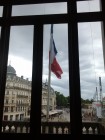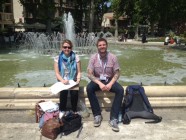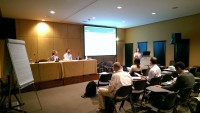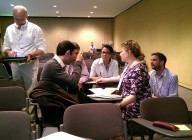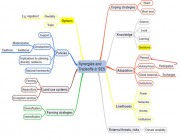Reflections on Resilience 2014 (Montpellier, 4-8th May 2014): ‘Conferences are perfect for….’
By Rachel Berman, Jami Dixon, Steve Orchard, and Paola Sakai.
Resilience2014 was the third International Science and Policy Conference. With over 1200 papers proposed, 700 papers and posters were accepted for the conference, including 5 from SRI. Jami, Rachel and Steve travelled down on Sunday 4th May by train (admittedly with a few hiccups due to Rachel’s sense of direction and heading to the wrong train, and Jami leaving her tickets in the office needing a detour from Steve to collect them). Paola, Claire and Lindsay were all flying in on the Monday from different parts of the world.
We didn’t think people would be interested in how hot & sunny it was, what we ate for breakfast, how fabulous the apartment was (and it really was), or how tired Steve was (but he really was). Instead, participating in the conference inspired us to think about our research, future careers and the bigger picture with our work, so we’ve shared some of these reflections below. There was a very packed programme across the 4 days, and in every session there were at least a couple of parallel talks each of us were keen to attend, resulting in a very thought-provoking week.
‘Networking’
At such a large conference with such a diverse range of interesting and inspirational participants, networking is crucial. From the outset we identified people that we’d like to talk to and from the presentations, posters and interesting sessions more were added to the list. Trying to track people down prompted us to reflect on the fine art of conference networking. Obviously networking is essential for career progression, building collaborations and generating ideas. Yet in practice, there seems to be a very fine line between conference networking and stalking. For example, one afternoon a significant amount of ‘free time’ was spent going up and down escalators trying to engineer a situation to casually ‘bump into’ one of the speakers from an earlier session. The networking mission was aborted when said speaker disappeared into the toilets! In such instances, perhaps it’s better to be more direct, but there was just something about the whole situation that screams celebrity stalker. This can be compared with another situation, the same day, where chatting in one of the more participatory sessions about research areas led to the identification of potential collaborations and business cards being exchanged.
These scenarios got us thinking about large conferences, how they are structured and how this shapes networking opportunities. We came to the conclusion that more participatory sessions should be encouraged to create space for dialogue, discussion and debate. We also decided that conferences should have a networking app to enable you to identify people of interest, introduce yourself, and arrange meetings. As early career researchers, we hope there’ll be many more opportunities and future conferences to brush up on our network abilities!
…..Self-reflection
Conferences can be great for networking and future academic career prospects, but what about the impact they have on the here and now? Everyone talks about PhD ups and downs: you can have several weeks of progress and everything coming together, to then hit a brick wall and feel like you’re in a deep trough with very little sign of the progress you had a few days ago. Listening to people talk about their research at a conference can make it very easy for a PhD researcher to start picking holes in their own research, or worrying about how it hasn’t quite all come together (thankfully fellow PhD friends can help in overcoming these gloomy patches).
As an academic you have to open yourself up to criticism: it’s part of the research process. You present an idea or theory, and somewhere along the line someone will critique it. The conference was a great environment to challenge yourself, both personally and theoretically. Attending talks and sessions and thinking through how what’s presented impacts or relates to your work is a great opportunity to improve your research. However, it also presents an environment in which it becomes important to recognise your own emotions and work to improve your own resilience. Whilst the conference proved a more emotional experience than we may be predicted, it’s certainly rejuvenated our enthusiasm for our research.
….Presenting
Paola presented two papers in a separate session during the second day of the conference (6 May). The first one is derived from her PhD thesis and focuses on measuring the resilience of Small and Medium Enterprises (SMEs) to climate variations and extremes. Paola’s second paper analysed how the UK water sector is using the concept to move the adaptation agenda forward. This particular research forms part of the Inform Climate Adaptation Decisions (ICAD) project, which is led by Suraje Dessai. Presenting two different papers constituted a great opportunity for Paola to showcase the direction that her research is taking. Most importantly, Paola received very good feedback from a good number of attendees. In addition, a good discussion was generated, which resulted in interesting comments and some useful contacts being made.
Steve, Jami and Rachel’s session “Assessing the Trade-Offs and Synergies between Coping, Adjusting and Transformation” was on the fourth day of the conference. It was comprised of three five minute presentations by us, followed by brief panel reflections then the floor was to be opened up for audience participation and dialogue. Rachel presented an outline of her work looking at the trade-offs in coping and adaptation in Uganda, Jami spoke about policy trade-offs, also in Uganda, and Steve presented briefly on the trade-offs between livelihoods and resilience of mangrove systems in Vietnam. Lindsay and Claire participated in our panel, alongside Ioan Fazey and Christo Fabricius. After much deliberation between panellists and ourselves concerning the format of our session, mixed with varying degrees of apprehension by all, preparations went well and we went into the session with confidence. The only slight concern was not being able to find all session panellist, but this was addressed at the last moment when Steve serendipitously bumped into Christo on an escalator an hour before the session started (or was he networking?!).
We had always intended for the session to be more participatory to encourage dialogue amongst the audience and panel. However, as the conference was so large our session was competing with approximately 30 parallel sessions. Subsequently, there ended up being more people on the panel than in the audience (or just about!). Nevertheless, this did make for a more in-depth discussion with productive feedback provided on all three presentations. Christo rounded up the session with this impressive and comprehensive technical contribution, summing up the main points and reflections regarding resilience trade-offs that were discussed during the session.
…. Thinking
Resilience thinking is currently very topical and is gaining more and more relevance in academic and policy circles. It is impressive to see how the field is evolving and the variety of themes in which resilience is applied. As Buzz Holling, resilience guru, mentioned in the closing ceremony, research on resilience has expanded significantly and is now studied from many different approaches, from the purely conceptual to the empirical.
It was great to see so many talks and take part in discussions about the social dimensions, of resilience, power, politics and agency, but it seems that we’ve still got a long way to go. There is still no common understanding of what we mean by resilience. ‘Resilience’ is being increasingly used by academic, policy makers, and practitioners alike. Without a doubt international and aid organisations, as well as policy makers around the world are increasingly adopting the concept. However, the meaning they attach to the concept generally varies and sometimes it is even misused, and there is a need to devote more efforts to define the concept. As researchers we need to be aware of this and further explore the discourses surrounding resilience, the potential discursive traps of labelling an individual, community or system resilient, and the implications of this in practice – there is much to be done!
If you’re interested in outputs from the conference the click this link.
Rachel Berman, Jami Dixon, Steve Orchard, and Paola Sakai.

